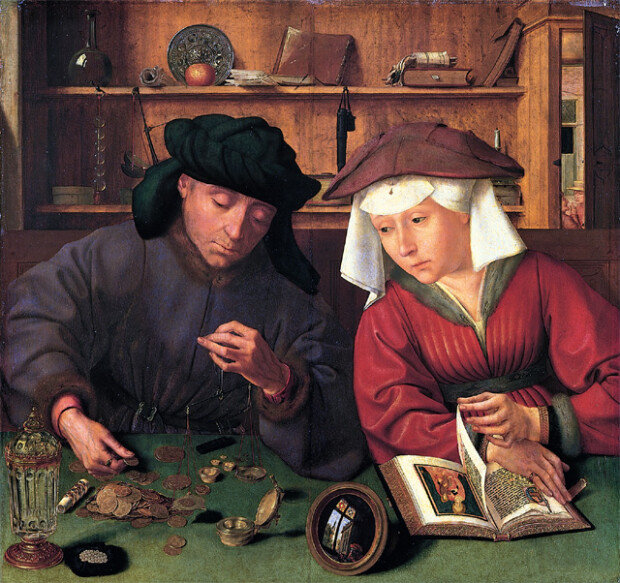Greed for money
Greed for money
Posted April. 02, 2020 07:47,
Updated April. 02, 2020 07:47

Capitalism has flourished while encouraging people’s greed. Antwerp in Belgium was the busiest trade port and the center of commerce and industry in 16th-century Europe. As foreign merchants flocked to the city, many accumulated wealth through currency exchange and usury and enjoyed the bourgeois lifestyle with luxury mansions.
A painting by Quentin Matsys of Antwerp features a well-dressed money lender and his wife. The husband is busy weighing coins on the table. Meanwhile, the wife who is reading a prayer book seems distracted. Her hand is turning a page but her eyes are focused on money and the scale. There are pearls, jewelry, and a decorative water bottle, in addition to the coins, on the table while the shelves in the background store books, documents, decorative plates, an apple, a rosary, and an extinguished candle. Two men peeked through a slightly open door must be either gossiping neighbors or loan customers.
At first, the painting may look like a portrait commissioned by a successful money lender to show off his wealth. However, it is indeed a satire with moral lessons. The painting is full of symbols. Money, gold, and pearls in front of the husband symbolize human’s greed. An apple on the shelf represents corruption and original sin while an extinguished candle indicates death. These objects deliver a message that greed is sin and everything is meaningless in the face of death. Furthermore, a scale symbolizes fairness and trust, which represents a warning that scaling should be done fairly and otherwise trust will be lost. A convex mirror in the middle of the table draws the most attention. The mirror reflects a distressed old man in front of a window, whose frames resemble the Cross with a church in the background.
The old man could be the painter himself reflecting on his past life in front of God or the money lender in the future. Money is another name of greed. The 16th-century painting’s moral lessons that those who disregard ethics and conscience as the slaves of greed will be ultimately judged by God seem still valid in present times dominated by money and greed.
Headline News
- Med professors announce intention to leave hospitals starting Thursday
- Bridge honoring Sgt. Moon Jae-sik unveiled in Pennsylvania
- Chief of Staff Chung tells presidential secretaries to stay away from politics
- US FTC bans noncompete agreements
- N. Korea launches cyberattacks on S. Korea's defense companies







